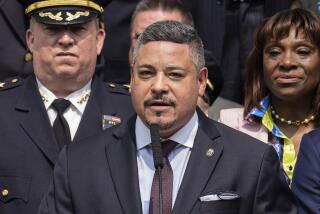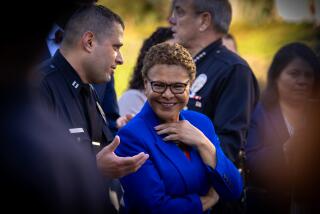Growing Pressure Seen Behind Mayor’s Action : Politics: But sources close to Bradley say the move is part of a carefully planned strategy to oust Gates.
Mayor Tom Bradley’s call for the resignation of Los Angeles Police Chief Daryl F. Gates surprised many at City Hall with its timing--just one day after Bradley had formed a special commission to investigate the Police Department.
But Bradley’s speech on Tuesday was also seen by some as an inevitable step in a controversy that has continued to escalate, dividing the city and tarnishing its image nationwide. Bradley had to act soon to try to force Gates’ ouster or face political damage himself, according to City Hall insiders and community leaders.
With Gates refusing to step down, Bradley found himself under increasing pressure from African-Americans and community organizations outraged over the March 3 police beating of black motorist Rodney G. King.
Bradley found his leadership questioned at a time when he was making endorsements in next Tuesday’s City Council elections, and he faced the risk of being upstaged by potential challengers in a 1993 mayoral race.
Against such a backdrop, Bradley took the momentous step of calling for the removal of a powerful police chief with 13 years in office. Insiders familiar with Bradley’s thinking described the move as merely the latest and biggest step in a “carefully planned” strategy to to force out Gates.
In making the move, Bradley laid the political groundwork for action by the Police Commission, which is now in a stronger position to seek Gates’ removal, according to two sources close to Bradley.
Reached for comment, Commissioner Melanie Lomax would only say that the commission is considering a number of options. “I think the Police Commission has an additional burden based on the mayor’s statement and the current climate (to decide) how it views the performance and continued leadership of Daryl Gates,” Lomax said.
“It is squarely before us,” she said. “. . . It places an extra burden on us to address this issue with all deliberate speed.”
Several sources said that one option being explored is ordering Gates to temporarily surrender his duties while several investigations of the department are conducted by federal and local agencies. Should Gates refuse, the sources said, the commission might be able to bring a charge of insubordination, possibly setting the stage for disciplinary action.
Two sources said that the Police Commission will meet in a special session Thursday to discuss the issue.
Others at City Hall predicted that the mayor’s effort would backfire because he is misjudging the chief’s public support and his dogged determination to keep his job.
“The mayor, in continuing to keep this issue burning, is really creating a lot of divisive feelings around the city,” said Councilman Hal Bernson, a Gates supporter who is campaigning for reelection next week in the San Fernando Valley. “If it comes down to head to head between the mayor and the chief . . . I think the mayor is going to lose.”
Although Bradley’s campaign against Gates has failed so far, a number of important pieces have been put in place, according to sources close to Bradley. First, Bradley nominated a civil libertarian, Stanley K. Sheinbaum, to the Police Commission, giving the panel another strong political ally of Bradley. The mayor’s office then ordered his appointees on the Police Commission to work with Gates to release transcripts of the controversial statements made by officers before and after the King beating--transcripts that included racial slurs.
Next, Bradley’s office forced out a member of the Civil Service Commission--which ultimately could decide Gates’ fate with the city--and brought in labor lawyer Larry Drasin, a longtime supporter of the mayor.
After that, Bradley’s office made overtures to council members, hoping to persuade them to come out publicly against Gates.
Finally, the mayor’s office established the so-called Christopher Commission to run an independent investigation into police use of force, perhaps setting the stage for the Police Commission to ask the chief to step aside pending the probe’s outcome.
Councilman Michael Woo--the only council member to call for Gates’ resignation--said he has conferred with Bradley’s office on the Gates issue in the past. But he insisted Tuesday that he was not consulted about Bradley’s call for Gates to resign.
Even so, Woo seemed to agree that the stage was now set for Police Commission action.
“I think the Police Commission is moving in the direction . . . of considering the removal of the chief,” Woo said. “I think the mayor wants to make his position clear in advance of the Police Commission action. It’s appropriate (for the commission) to look to him for leadership.”
Woo, who is a potential mayoral candidate, made Easter visits to churches in the black community, where outrage over the King beating and demands for Gates’ resignation have been particularly strong. But he dismissed any link between those visits and the timing of the announcement by the mayor, who has not ruled out the possibility of seeking a sixth term.
City Hall sources said they believed there was virtually no political risk for Bradley in calling for Gates to step down at this time.
A Times poll in late March found that almost one of three Los Angeles residents wanted Gates to resign immediately, and another one of three wanted Gates to resign if inquiries find wrongdoing by his officers in the King case.
About half the respondents said that Bradley was doing what he should in handling the controversy, while 34% thought he was being too lenient and only 5% thought he was too tough. Among blacks, 46% thought Bradley was being too lenient with Gates, while only 5% thought the mayor was being too tough.
Political observers say Bradley’s move Tuesday would deflect criticism that he has been too indecisive during the crisis.
“I commend him and give him high marks for taking this decisive step,” said Los Angeles Urban League President John Mack. “ . . . There has been growing impatience among the mayor’s supporters, particularly in (the black) community.”
Bradley’s call for Gates’ resignation could help candidates supported by Bradley in next week’s City Council elections, especially in the heavily black inner-city districts. In the 9th District, for example, Bradley has endorsed Rita Walters for the seat held by the late Gilbert W. Lindsay, and some of her opponents have criticized the mayor’s reluctance to demand Gates’ ouster.
City Councilman Richard Alatorre, a Bradley ally who is seeking reelection in East Los Angeles, came close to following Bradley’s lead Tuesday night. “I have serious concerns as to whether the chief can continue to lead under the present circumstances,” said Alatorre, who heads the council panel that oversees Gates’ department.
Longtime political consultant Joe Cerrell, of Cerrell Associates, described Bradley’s action by saying, “It shows he’s trying to lead. . . . The problem is, it would seem a little inconsistent since he just appointed a commission to look into the matter. . . . Why doesn’t he wait to see what the commission has to say?
“I know he’s under pressure to do this, I’d say primarily from the black community and the liberals.”
Initial reaction to Bradley’s announcement in the black community was positive. The Rev. Cecil L. Murray of First African Methodist Episcopal Church said, “I think that it was inevitable, necessary and good. I think the mayor . . . has come to the conclusion that there is no other” solution.
“I’m sure now that he has demanded the police chief’s resignation he will follow through on his demand,” Murray said, “because a sizable portion of his constituency feels that their well-being is at stake.”
The Rev. Frank Higgins of Trueway Baptist Church criticized Bradley for taking so long to call for Gates’ removal and described anti-Gates sentiment in the black community as “snowballing.”
“In some regards we appreciate Bradley’s decision” to call for Gates’ resignation, said Higgins, president of the 400-member Baptist Ministers Conference of Los Angeles and Southern California. “But he could have done something sooner. We need a radical change of leadership to address this situation. Bradley said he couldn’t fire (Gates). Well, he should have fired him anyway.”
Council President John Ferraro said he will continue to support Gates despite Bradley’s speech and expects other elected officials to do the same.
Gates supporter Eric Rose, a consultant for the chief’s exploratory campaign for governor in 1988, accused Bradley of continuing a “political war (that) will be more unpopular than Vietnam.” With Tuesday’s speech, Rose said, Bradley has “tossed a hand grenade into a city that was just beginning to heal.”
Times staff writers Glenn F. Bunting, Paul Feldman and John L. Mitchell contributed to this story.
More to Read
Sign up for Essential California
The most important California stories and recommendations in your inbox every morning.
You may occasionally receive promotional content from the Los Angeles Times.










